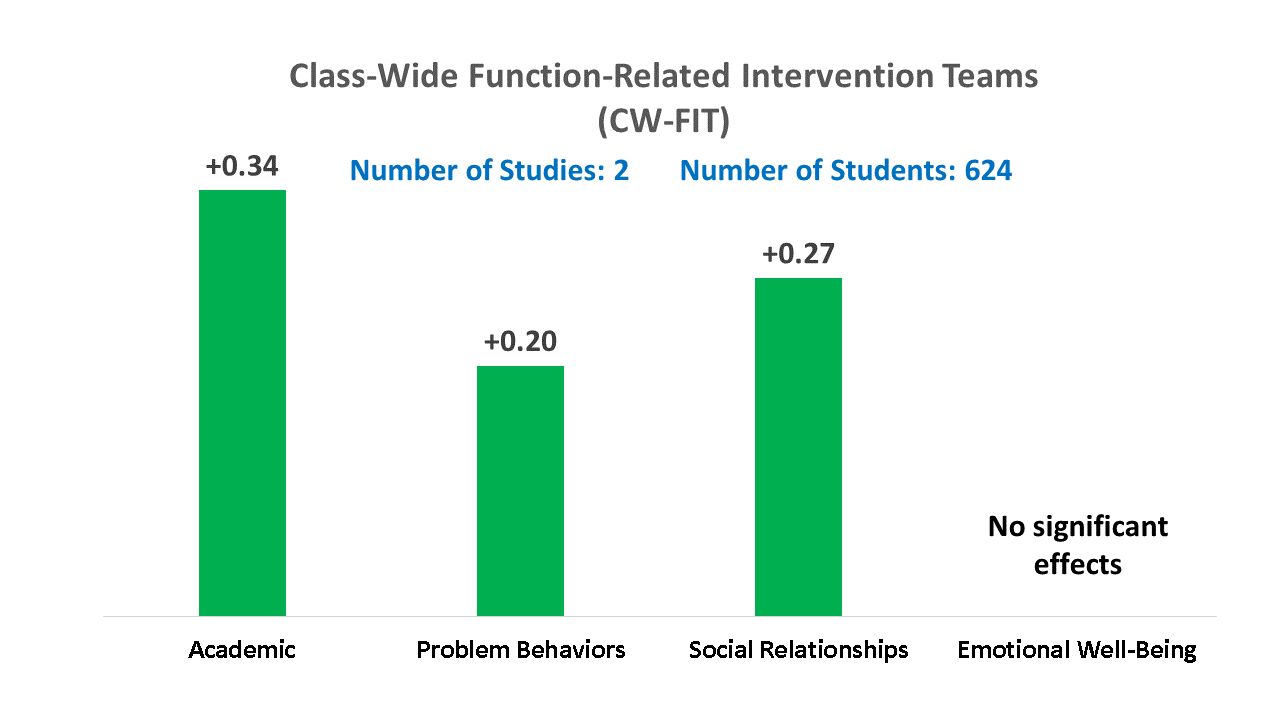
Program Description
Class-Wide Function-Related Intervention Teams (CW-FIT) is a classroom program designed to increase academic, social, and behavioral success for students. The program emphasizes group contingencies and self-management. In the group contingency component, students are divided into teams. One period 3-5 days each week, the teams have an opportunity to demonstrate skills, such as gaining the teacher’s attention, staying on task, and ignoring inappropriate behaviors of classmates. Goals are set in terms of using these skills, and all teams that meet these goals earn points or small rewards. The self-management component, used with students not responding adequately to the group contingencies, uses “help cards” that cue students to use strategies such as goal-setting, self-monitoring, self-evaluation, and self-reinforcement (for example, a card might suggest that students quietly celebrate when they are able to stay on task, or when they can ignore others’ misbehavior). Teachers receive 2 hours of initial training and then visits from coaches who give feedback on program fidelity.
Program Outcomes
Caldarella et al. (2018) and Wills et al. (2018) carried out an evaluation of CW-FIT with 311 students with emotional behavioral disorders (EBD). 83 teachers were randomly assigned to CW-FIT and 74 to control by in 19 culturally diverse schools in Missouri, Tennessee, and Utah. 43% of students were White, 39% African American, and 15% Hispanic. The program was used over a 4-month period. Outcome measures were derived from observations by trained observers. There were significant differences on academic engagement (ES= +0.30), aggression/conduct problems (ES=+0.17), social skills (ES=+0.26), empathy (ES=+0.26), disruptive behavior (ES=+0.22), and interpersonal relationships (ES=+0.37). There were no differences on bullying, emotional regulation, or reduction of anxiety/depression.
A second study by Wills et al. (2016) also found positive effects on disruptive behavior (ES=+0.38) and academic engagement (ES=+0.47). This study focused on 313 students who had emotional behavioral disorders (EBD) or were known to be at risk for EBD. These students were in 159 classrooms in 17 schools. 76% were boys, 23% girls. 68% of students were members of minority groups, 66% were eligible for free- or reduced-price lunches, and 26% had IEPs, mostly for learning disabilities. The classes were randomly assigned within schools to use CW-FIT or to serve in a control group.
The positive effects on academic engagement and disruptive behavior across both studies, as well as the positive findings in social skills, interpersonal relationships, and empathy, qualified CW-FIT for the ESSA “Strong” rating in the academic (ES=+0.34), problem behaviors (ES=+0.20), and social relationships (ES=+0.27) categories.
Staffing Requirements
No additional staff
Professional Development/Training
2 hours of initial training plus follow-up visits
Technology
None required
